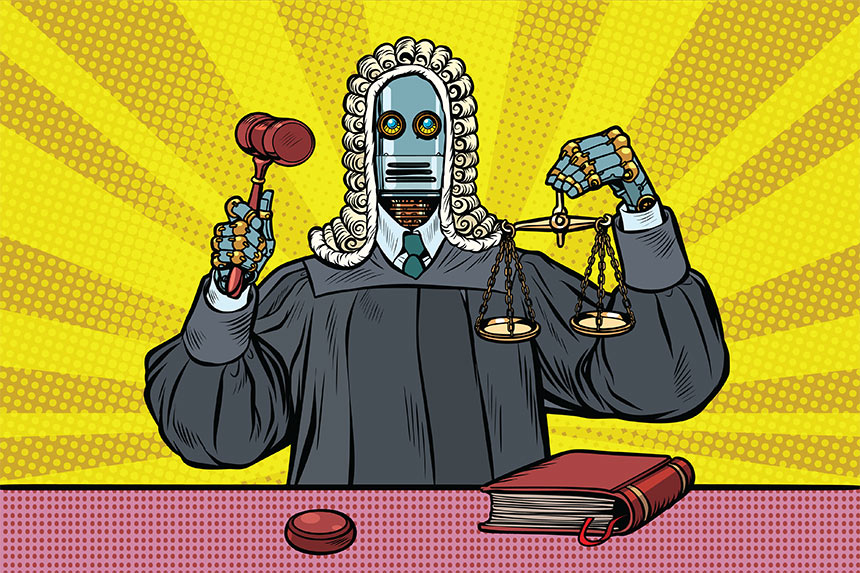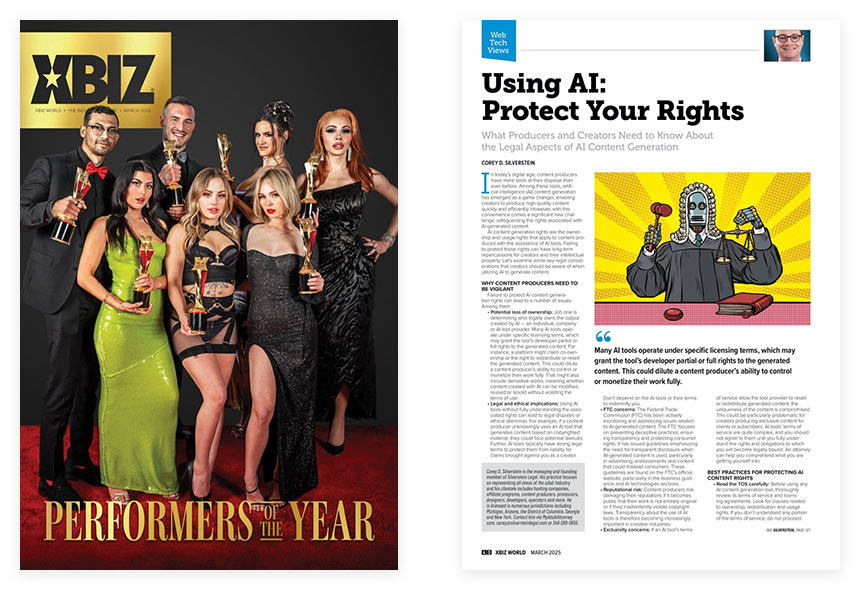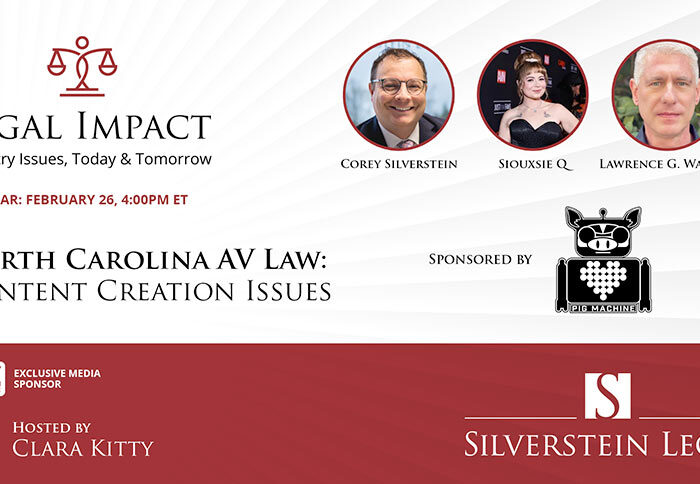Cyberspace (February 4, 2026) - Corey D. Silverstein, the driving force behind MyAdultAttorney.com and Adult.Law,…

In today’s digital age, content producers have more tools at their disposal than ever before. Among these tools, artificial intelligence (AI) content generation has emerged as a game-changer, enabling creators to produce high-quality content quickly and efficiently. However, with this convenience comes a significant responsibility: safeguarding the rights associated with AI-generated content. Failing to do so can have long-term repercussions for creators and their intellectual property. Regardless of the type of content that you are creating, the game has changed and there quite a few legal considerations.
Featured In The March 2025 Edition Of XBIZ World

Understanding AI Content Generation Rights
AI content generation rights refer to the ownership and usage rights of content produced with the assistance of AI tools. These rights often extend to include the following aspects:
Ownership of Generated Content
Determining who legally owns the output created by AI — the individual, organization, or AI tool provider.
Licensing Agreements
Many AI tools operate under specific licensing terms, which may grant the tool’s developer partial or full rights to the generated content.
Derivative Works
Understanding whether the content created with AI can be modified, reused, or resold without violating the terms of use.
Warning! Why Content Producers Need to Be Vigilant
Potential Loss of Ownership
Many AI content generation platforms include clauses in their terms of service that allow the provider to retain some rights to the content created using their tools. For instance, a platform might claim co-ownership or the right to redistribute or resell the generated content. This could dilute a content producer’s ability to fully control or monetize their work.
Legal and Ethical Implications
Using AI tools without fully understanding the associated rights can lead to legal disputes or ethical dilemmas. For example, if a content producer unknowingly uses an AI tool that generates content based on copyrighted material, they could face potential lawsuits. Further, the AI tools typically have strong legal terms so protect them from being liable for claims brought against you, so don’t depend on the AI tools to indemnify you.
FTC Concerns
The Federal Trade Commission (FTC) has been actively monitoring and addressing issues related to AI-generated content. The FTC focuses on preventing deceptive practices, ensuring transparency, and protecting consumer rights. They have issued guidelines emphasizing the need for clear disclosure when AI-generated content is used, particularly in advertising, endorsements, and content that could mislead consumers. You can find these guidelines on the FTC’s official website, particularly in their sections on business guidance and AI technologies.
Reputation Risks
Content producers risk damaging their reputations if it becomes public that their work is not entirely original or if they inadvertently violate copyright laws. Transparency about the use of AI tools is becoming increasingly important in creative industries.
Exclusivity Concerns
If an AI tool’s terms of service allow the provider to resell or redistribute generated content, the uniqueness of the content is compromised. This could be particularly problematic for creators producing exclusive content for clients or subscribers. Speaking of terms of service, AI tools’ terms of service are quite complex, and you should not agree to them until you fully understand the rights and obligations that you become legally bound to. Have an attorney of your own choosing assist you with comprehending what you are getting yourself into.
Best Practices for Protecting AI Content Rights
Read the Terms of Service Carefully
Before using any AI content generation tool, thoroughly review its terms of service and licensing agreements. Look for clauses related to ownership, redistribution, and usage rights. If you don’t understand any portion of the terms of service, do not proceed and seek further clarification or legal advice.
Only Choose Tools with Clear Ownership Policies
Choose AI platforms that explicitly grant full ownership of generated content to the user. Many premium tools offer such assurances to attract professional content creators.
Maintain a Hybrid Workflow
Combine AI-generated content with your own unique inputs to retain greater control over the final product. This approach not only adds a personal touch but also reduces reliance on AI tools.
Document Your Workflow
Keep records of the tools and processes used in content creation. This can help establish ownership and demonstrate originality if disputes arise.
Consult Legal Experts
For content producers working on high-value projects, consulting an intellectual property attorney can help clarify rights and ensure compliance with applicable laws.
The Future of AI Content Rights
As AI technology continues to evolve, so will the legal frameworks governing its use. Content producers must stay informed about changes in laws and industry standards to protect their interests. Collaboration between creators, legal experts, and AI developers will be crucial in shaping a fair and transparent ecosystem.
Quick Wrap-up
AI content generation offers unparalleled opportunities for content producers, but it also comes with significant responsibilities. By understanding and protecting their rights, creators can leverage AI tools effectively while safeguarding their intellectual property. In an era where digital content is both abundant and valuable, vigilance is not just advisable — it’s essential. I am always happy to speak with existing or prospective clients about this new, evolving and complicated issue. Feel free to contact me through myadultattorney.com or by sending an email to corey@silversteinlegal.com.
This article does not constitute legal advice and is provided for your information only and should not be relied upon in lieu of consultation with legal advisors in your own jurisdiction. It may not be current as the laws in this area change frequently. Transmission of the information contained in this article is not intended to create, and the receipt does not constitute, an attorney-client relationship between sender and receiver.
About Silverstein Legal
Founded in 2006 by adult entertainment lawyer Corey D. Silverstein, Silverstein Legal is a boutique law firm that caters to the needs of anyone working in the adult entertainment industry. Silverstein Legal’s clients include hosting companies, affiliate programs, content producers, processors, designers, developers, and website operators.




